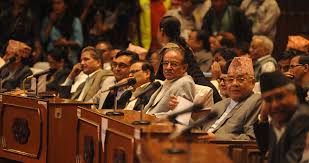Parties must come together to avert another crisis in Nepal (Commentary)
 Pritam Bhattarai / Kathmandu: Recently the Rastriya Prajatantra Party (RPP) merged with Rastriya Prajatantra Party Nepal (RPP-N). The two parties felt it necessary to unite after a decade of split. Most importantly, one of the surprising factors is that the unified Rastriya Prajatantra Party has put on hold the issue of ceremonial monarchy, an agenda that the RPP-N previously led Kamal Thapa had strongly been raising before the merger. There had not been any rifts and debates within the unified RPP when the decision was taken.
Pritam Bhattarai / Kathmandu: Recently the Rastriya Prajatantra Party (RPP) merged with Rastriya Prajatantra Party Nepal (RPP-N). The two parties felt it necessary to unite after a decade of split. Most importantly, one of the surprising factors is that the unified Rastriya Prajatantra Party has put on hold the issue of ceremonial monarchy, an agenda that the RPP-N previously led Kamal Thapa had strongly been raising before the merger. There had not been any rifts and debates within the unified RPP when the decision was taken.
The unification between two parties is a very welcome step in the country which is in urgent need of consensus and agreement among political actors to resolve some political problems that have sharply divided parties, leaders and the society alike and are pushing the country to the brink of a crisis.
The division has already taken its toll on the cases of Dr Govinda KC, who is on a fast-onto-death to press for reforms in medical education and health sector and of suspended Chief of the Commission for the Investigation of Abuse of Authority (CIAA) Lok Man Singh, who is facing an impeachment motion at the parliament. And to add to that the division has also surfaced over the registration of the constitution amendment proposal in the Parliament.
Some political parties and groups in the government and opposition have supported the registration while others have strongly objected to it.
Furthermore, the issue has sparked widespread protests across the country rather than appeasing those who were in favour of the proposal pushed to increase acceptability of the constitution. Although some national and international sections including India have welcomed the move, the situation here is different. It has given birth to a new series of protests and it seems that the protests may result in serious consequence in absence of early efforts to take some steps in this regard.
On the other hand, some disgruntled Madhes-based political parties and some ethnic groups have also ruled out the relevance of the registration of the proposal. They have claimed that the proposal has not addressed their demands. So the question is what is the meaning of the proposal registration?
When the constitution was promulgated over 12 months ago, the Madhes-centric political parties protested it, claiming that it failed to address their concerns. Subsequently India expressed its concerns over the statute, calling for accommodation of all sections in it.
The anger was exhibited in the form of an undeclared economic blockade further fuelled by then agitating Madhesi people by blocking the supply of goods and fuels into Nepal at the border points. Then India’s move was to pressurize then KP Sharma Oli-led government to amend the constitution to bring all the disgruntled groups along. But the Oli refused to give in, resulting in strained relations between Nepal and India.
In order to topple the Oli-led government, CPN (Maoist Centre) Chairman Pushpa Kamal Dahal was cast as Prime Minister with the support of India and disgruntled groups. One of the agreements reached with the agitating Madhesi-centric parties was to amend the constitution.
So one would wonder what prompted Dahal to register the proposal without taking into account the voices of the people at home. He was reported to be under pressure to register the proposal despite protests against it from various quarters.
But what if the proposal had not been registered or if the constitution would not be acceptable to all? The matter is a serious one that must draw the attention of all our political actors and concerned authorities. It is crucial to implement the constitution effectively by increasing its acceptability. Holding elections are key to implementing the constitution. But in the present circumstances, it will be difficult to do so. So it is the need of hour to find a give-and-take approach for the sake of the country and all Nepalis and to save the country from plunging into further crisis. The only means of sailing the country through this difficult situation safely is consensus among all political parties. Those protesting the proposal must find a middle path to increase the acceptability of the constitution.
As for the Madhes-based political parties and some ethnic groups who have long been protesting to get their demands addressed, they earlier sat for talks with three different governments led by the Nepali Congress, CPN-UML and CPN (Maoist Centre) respectively, since they launched protest, without fruitful results. So now whom they expect to address all their demands, word by word? All demands raised may or may not be fulfilled. But it is also their responsibility to save the country from meeting another crisis by adopting a give-and-take approach. RSS
